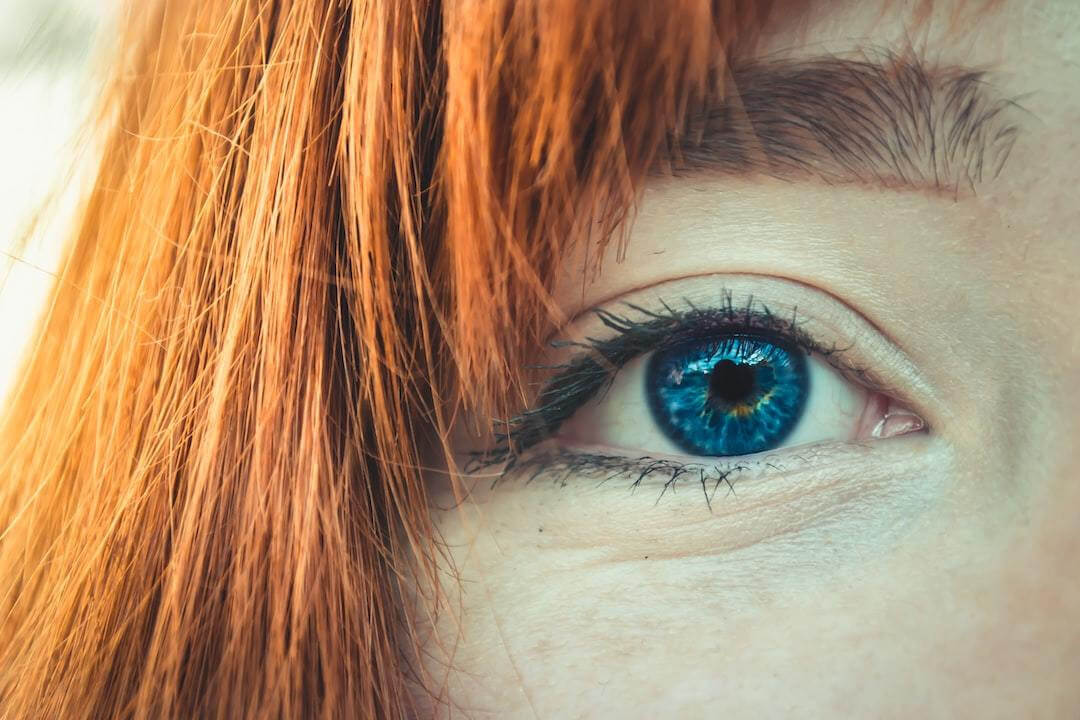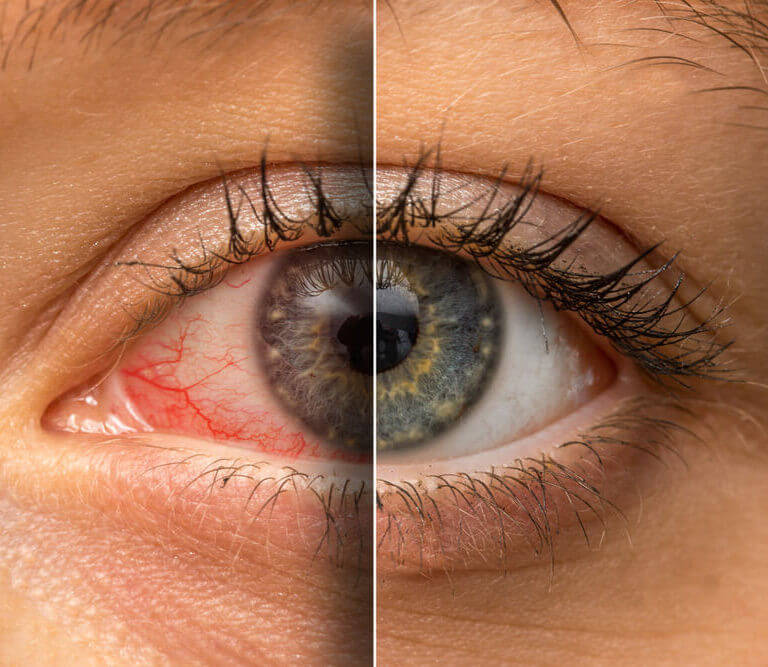Can dry eyes cause headaches? This is a question that many people suffering from dry eye syndrome often ask. Dry eyes, is an ocular condition characterized by decreased tear production or increased tear evaporation and can lead to various discomforts including eye strain and pain.
In this blog post, we delve into the causes of dry eyes, common symptoms associated with dry eye disease such as feeling your eyes feel dry in low humidity areas and more severe manifestations like migraines. We will explore how these symptoms can increase migraine headaches and neck pain due to the interconnected nature of our sensory system.
We'll also examine treatments available to manage dry eye disease effectively. From understanding tear osmolarity to scheduling regular eye exams with your trusted eye doctor, there are several ways you can maintain good eye health even when experiencing this condition.
Lastly, we will discuss preventive measures one can take to avoid exacerbating their condition or even prevent dry eyes altogether. So if you're wondering "can dry eyes cause headaches?" stay tuned for insightful information on maintaining optimal ocular health.
Table of Contents:
- Causes of Dry Eyes
- Symptoms of Dry Eyes
- Link Between Dry Eyes and Headaches
- Treat Dry Eyes Like a Boss
- 5 Tips to Prevent Dry Eyes
- Conclusion
Causes of Dry Eyes
Dry eyes are like a desert in your peepers. Here are some reasons why:
Environmental Conditions
Dry air, dust, smoke, and wind can all make your eyes feel like the Sahara. Staring at screens for hours on end doesn't help either.
Medications
Some meds can dry out your eyes faster than a towel in the sun. Check with your doc if you suspect your pills are the culprit.
Medical Conditions
Diabetes, rheumatoid arthritis, thyroid disorders, and vitamin A deficiency can all contribute to dry eyes. Not cool, body.
Aging Process & Hormonal Changes
Getting older and going through menopause can also make your eyes feel like they're in the middle of a drought.
Don't suffer in silence. Knowing what causes dry eyes can help you prevent and treat them. Stay moist, my friends.
2. Symptoms of Dry Eyes
Frequent sufferers of dry eyes may recognize the telltale sign of a gritty sensation in their eyes. This condition can manifest itself through various symptoms that may affect your daily life.
Burning Sensation: One common symptom is a burning or stinging feeling in the eyes. It's as if there's sand trapped under your eyelids, causing constant irritation and discomfort.
Itching: Alongside burning, many people experience intense itching. The urge to rub your eyes might be overwhelming at times but resist it. Rubbing only exacerbates the problem and could potentially lead to further complications like eye infections.
Redness: As a result of all this irritation, redness often accompanies dry eye syndrome. Your whites of the eye may appear bloodshot due to inflammation caused by lack of lubrication.
Sensitivity to Light:: If bright lights make you squint or close your eyes completely, light sensitivity could be another sign that you're dealing with dry eye symptoms.
The degree and mix of these indications may differ from individual to person contingent upon various components, for example, age, general wellbeing status and introduction to explicit ecological conditions.
Persistent Blurred Vision: A Warning Sign?
A less common but significant symptom is blurred vision which persists even after blinking multiple times. While occasional blurriness might not raise alarm bells immediately (after all who hasn't rubbed their tired peepers after staring at screens for too long?), persistent blurry vision warrants attention from an ophthalmologist or optometrist right away.
This is because chronic blurred vision could indicate severe damage done by prolonged untreated dry eye syndrome or it might also point towards other underlying ocular diseases such as glaucoma or macular degeneration.American Academy Of Ophthalmology
Mucus In Or Around The Eye: Not Just Sleep Dust.
Last but not least we have mucus discharge around the corners or inside our eyeballs commonly referred as 'sleep dust'. However when its production increases significantly accompanied by other aforementioned symptoms then it's time for a check-up.HealthLine
In conclusion recognizing these signs early on will allow timely intervention thereby preventing any potential harm caused by unchecked progression of this condition.So keep those beautiful orbs well-lubricated folks. And remember if something feels off don't hesitate reaching out professional help .Your sight deserves utmost care.
Dry eyes can cause a range of uncomfortable symptoms, including burning, itching, redness and sensitivity to light. In severe cases, chronic dry eye syndrome can lead to persistent blurred vision or ocular headaches that are often misdiagnosed as migraines. It's important to recognize the signs early on and seek professional help for proper diagnosis and treatment.
Can Dry Eyes Cause Headaches: Understand the connection
Yes, they can. When your eyes lack adequate moisture, it can lead to a condition known as dry eye syndrome. This can cause discomfort and force your eyes to work harder than usual, resulting in muscle tension around the forehead, temples, and eyebrows - areas where many people commonly feel headache pain.
Dry Eye Strain and Headache Connection
The constant squinting or blinking associated with dryness can further exacerbate this tension leading up to what we call a headache behind the eye.
Migraines Induced by Dry Eyes
In some cases, severe dry eyes could even trigger migraines - severe headaches usually felt on one side of the head. Migraine sufferers often report light sensitivity which are also common dry eye symptoms.
Photophobia: A Shared Symptom
Photophobia, or light sensitivity, makes bright lights uncomfortable for those experiencing it. In response, individuals might squint or close their eyes tightly causing additional strain that potentially leads into a headache cycle.
Digital Eye Strain: A Modern Culprit
Excessive screen time exposure can cause digital eyestrain, also known as Computer Vision Syndrome (CVS). This can bring about symptoms like blurred vision, burning sensations in the eye area, and neck pain, besides triggering both chronic migraine headaches and acute migraine attacks due to its linkages with improper posture. More information about CVS can be found at the American Academy Of Ophthalmology website here.
To sum up, if you experience headaches and your eyes feel dry, alongside common symptoms indicative of possible dry eye syndrome, seeking medical attention promptly would definitely be advisable.
Treat Dry Eyes Like a Boss
Dry eyes are a pain in the cornea, but you don't have to suffer in silence. Here are some treatment options that will make your eyes feel like they're living their best life.
Artificial Tears: The MVP
When it comes to dry eyes, artificial tears are the real MVP. They're like a refreshing drink of water for your eyes, keeping them moist and comfortable all day long. For the perfect solution to your dry eye woes, explore a range of artificial tears options.
Not sure which one to pick? Check out WebMD's guide on treating dry eyes.
Lubricating Ointments: The Night Owl
If artificial tears aren't cutting it, lubricating ointments are the night owl of the dry eye world. They provide longer-lasting relief than drops, but can make your vision blurry for a bit. Try lubricating ointments before sleeping for a longer-lasting relief from dry eyes, though your vision may be temporarily blurry.
Prescription Medications: The Heavy Hitters
If your dry eyes are playing hard to get, it's time to bring in the heavy hitters - prescription medications. Cyclosporine helps increase tear production, while steroid eye drops reduce inflammation. Punctal plugs may also be inserted to retain moisture on the surface of your eyes.
Note: Always Consult Your Doctor
Before trying any of these treatments, make sure to consult your eye doctor. They'll help you find the best solution for your dry eyes.
5 Tips to Prevent Dry Eyes
But don't worry, you can prevent them from happening with these simple tips:
Avoid Environmental Triggers
Smoke and windy weather can make dry eyes worse. Quit smoking and stay indoors on windy days. Also, use humidifiers to keep the air moist.
Wear Protective Eyewear Outdoors
Sunglasses with good coverage can protect your eyes from wind and dust.
Maintain Good Eye Hygiene
Clean your eyelids regularly with warm water to remove debris that can cause irritation. Don't rub your eyes, use lubricating drops instead. And take breaks from screen time.
Give Your Eyes a Break
Staring at screens for too long can strain your eyes. Take periodic pauses every 20 minutes and glance away for a few moments to revive your eyesight.
Prevention is Better Than Cure
By following these tips, you can significantly lower your risk of developing dry eyes and avoid associated headaches. Remember, your sight is precious, so take care of your eyes.
Conclusion
Can dry eyes cause headaches? If your tear glands are slacking off or your tears are low quality, you may experience dry eyes, which can lead to irritation, redness, and even blurred vision - not to mention headaches.
Staring at screens or reading for long periods without blinking can cause eye strain, which can result in tension-type headaches that feel like a tight band around your head - but don't worry, there are treatments available like artificial tears, warm compresses, and lifestyle changes that can help prevent dry eyes from causing discomfort and pain.




.jpg)


